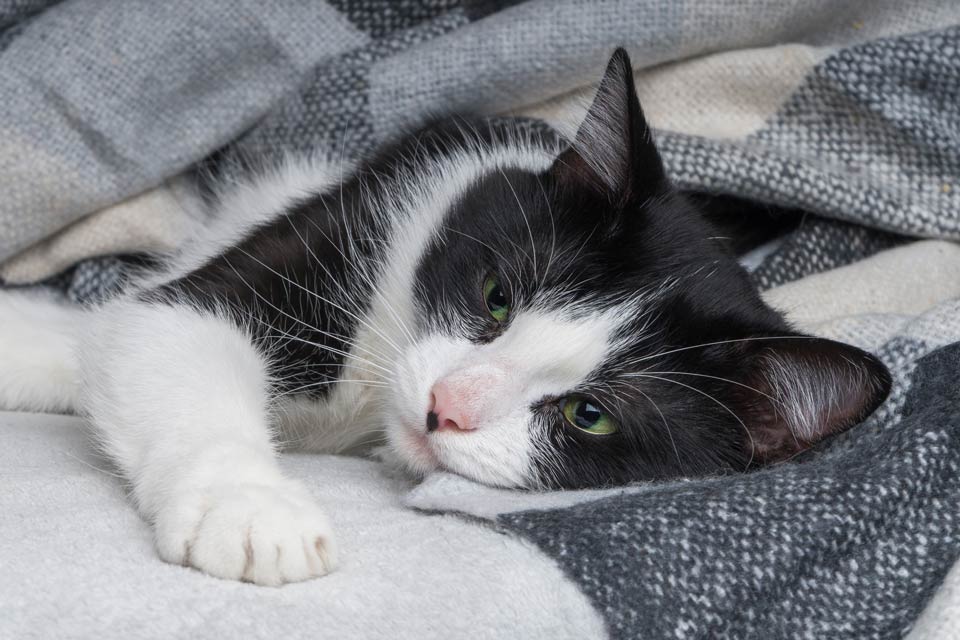Pyometra in Cats

Pyometra is a life-threatening bacterial infection of the uterus in cats.
What Causes Feline Pyometra?
Pyometra occurs because of the hormone changes that happen in a cat's body around their heat cycles. When a cat doesn't become pregnant over several cycles, the hormone progesterone stays high, causing the lining of the uterus to keep thickening and eventually develop cysts filled with fluid. That fluid secretes from the cysts and is excellent for growing bacteria.
But where do the bacteria come from?
Well, the cervix is relaxed because the cat's body is primed to allow sperm through. So, bacteria can get in. And the bacteria don't get expelled from the uterus because high progesterone also inhibits uterine cramps (so pregnancy can thrive). The bacteria aren't attacked by white blood cells as they usually would be because the body keeps WBCs out of the uterus when a cat is in heat, so they don't destroy any sperm that arrive there. Therefore, the bacteria can multiply until they overwhelm the cat's system.
Any intact (non-spayed) female cat can develop pyometra.
What Are the Signs of Pyometra in Cats?
The signs of pyometra in cats vary depending on whether the cervix is open. If it is, pus can drain from the uterus, and an owner may see it on the cat's fur or bedding. The cat may lick incessantly at the vagina to get rid of the pus.
If the cervix is closed, trapping the pus inside the uterus, the signs are often severe and come on quite rapidly. They can include:
- Fever
- Depression
- Lethargy
- Decreased or absent appetite
-
Distended and painful abdomen
- Vomiting
Eventually, toxins in the bloodstream due to the bacteria cause shock and, ultimately, death.
Cats with open cervix pyometra may or may not have the symptoms on the closed pyometra list, but if they do, they're usually milder than cases of closed cervix pyometra.
Diagnosis of Pyometra in Cats
A veterinarian will do a thorough exam of your cat and ask you questions. A history of not being spayed, having been in heat recently, and having a fever, inappetence, or vaginal discharge will all raise red flags for pyometra in the vet's mind.
Blood work may show elevated white blood cell counts. X-rays of the abdomen in cases of a closed cervix pyometra will show an enlarged uterus. An ultrasound can also reveal that.
Treatment of Pyometra in Cats
Surgery to remove the uterus and ovaries (spay surgery, ovariohysterectomy) is the best treatment for pyometra in cats. However, if the kitty quite sick, anesthesia may be extremely risky.
Additionally, the uterine tissue is much more fragile (delicate and easy to tear and bleed) during pyometra, so that increases surgical risk too.
Many cats must be treated with intravenous fluids and antibiotics before surgery in an attempt to get the cat in better shape for enduring the procedure.
Non-Surgical Treatment of Pyometra in Cats
It is strongly recommended that all cats with pyometra be treated surgically with the removal of the uterus. In some rare conditions, a cat may be treated with the hormone prostaglandin, which lowers progesterone, theoretically allowing the cervix to open and the uterine to contract to get the pus out. However, prostaglandins can cause abdominal pain and other side effects and sometimes don't work at all.
Some cats treated with prostaglandins experience uterine rupture, which is when the uterus breaks and pus fills the abdomen. Those cats are at high risk of death.
Pyometra that isn't treated will result in the death of the cat except in exceedingly rare instances.
Spaying cats before they go into their first heat can help them avoid pyometra (See this article for the one exception: "Ovarian Remnant Syndrome in Cats.")
You May Also Like These Articles:
X-Rays in Cats: What They Can Tell Your Vet
Ovarian Remnant Syndrome in Cats
Common Blood Tests Done on Cats
Notice: Ask-a-Vet is an affiliated service for those who wish to speak with a veterinary professional about their pet's specific condition. Initially, a bot will ask questions to determine the general nature of your concern. Then, you will be transferred to a human. There is a charge for the service if you choose to connect to a veterinarian. Ask-a-Vet is not manned by the staff or owners of CatHealth.com, and the advice given should not delay or replace a visit to your veterinarian.






